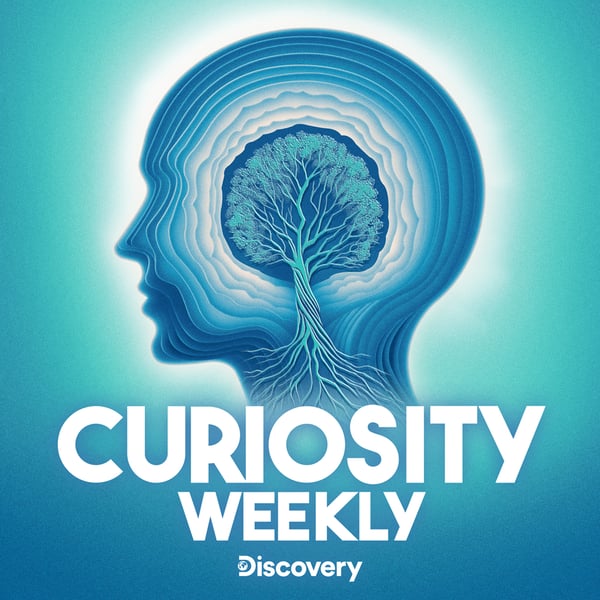Passion for Your Job Can Backfire, Ancient Greeks Knew Earth Was Round, and Hair in Food
Curiosity Weekly
Warner Bros. Discovery
4.6 • 935 Ratings
🗓️ 4 June 2019
⏱️ 9 minutes
🧾️ Download transcript
Summary
Learn about how the ancient Greeks knew the Earth was round; why being passionate about your job can backfire; and why you shouldn’t worry if you find a hair in your food.
Please support our sponsors! Visit capterra.com/curiosity to find the best software solution for your business — for free!
In this podcast, Cody Gough and Ashley Hamer discuss the following stories from Curiosity.com to help you get smarter and learn something new in just a few minutes:
- How the Ancient Greeks Knew the Earth Was Round — https://curiosity.im/2HHagcp
- Passion for Your Job Can Backfire, According to a Study — https://curiosity.im/2WBKhg9
- Should You Worry About a Hair in Your Food? — https://curiosity.im/2HOoMzg
If you love our show and you're interested in hearing full-length interviews, then please consider supporting us on Patreon. You'll get exclusive episodes and access to our archives as soon as you become a Patron! https://www.patreon.com/curiositydotcom
Download the FREE 5-star Curiosity app for Android and iOS at https://curiosity.im/podcast-app. And Amazon smart speaker users: you can listen to our podcast as part of your Amazon Alexa Flash Briefing — just click “enable” here: https://curiosity.im/podcast-flash-briefing.
Find episode transcript here: https://curiosity-daily-4e53644e.simplecast.com/episodes/passion-for-your-job-can-backfire-ancient-greeks-knew-earth-was-round-and-hair-in-food
Hosted on Acast. See acast.com/privacy for more information.
Transcript
Click on a timestamp to play from that location
| 0:00.0 | Hi, we're here from curiosity.com to help you get smarter in just a few minutes. |
| 0:05.0 | I'm Cody Gough. |
| 0:06.0 | And I'm Ashley Hamer. |
| 0:07.0 | Today you learn about how the ancient Greeks knew the earth was round, why being passionate about your job can backfire, |
| 0:13.7 | and why you shouldn't worry if you find a hair in your food. |
| 0:16.8 | What satisfy some curiosity. |
| 0:18.7 | Did you know that even the ancient Greeks |
| 0:21.4 | knew the earth was round? Yeah, this is actually a thing we've been |
| 0:24.8 | aware of for more than 2,000 years. And the story of how they knew it was round is a |
| 0:29.7 | good one, so let's get into it. The philosopher and mathematician Pythagoras is credited as the first to propose a spherical earth back in 500 BC, though he did so on aesthetic grounds. He believed the sphere was the most perfect shape. A century later, the philosopher |
| 0:46.4 | Plato suggested the same thing, which boosted the idea's popularity. But when it comes to |
| 0:51.7 | proving the Earth is round, Aristotle was the first Greek |
| 0:55.2 | philosopher to put his money where his mouth was. When he was writing his book |
| 0:59.0 | On the Heavens in 350 BC, he laid out several pieces of evidence for the Earth having a spherical shape. |
| 1:05.7 | For one thing, he pointed out, you can see the shadow of the Earth on the Moon during a lunar |
| 1:10.1 | eclipse, and since that shadow is always round regardless of where the Earth is in its rotation, |
| 1:16.0 | you know the Earth is a sphere. |
| 1:18.1 | For another thing, the stars are in different positions depending on where you are on Earth. There were stars in Egypt that couldn't be seen in Cyprus hundreds of miles away. |
| 1:27.0 | He wrote that that proved, quote, not only that the Earth is circular in shape, but also that it is a sphere of no great size, for otherwise |
| 1:35.8 | the effect of so slight a change of place would not be quickly apparent." |
| 1:41.2 | Later, another scholar named Eratosthenes did Aristotle one better. |
| 1:46.0 | He didn't just prove the Earth was a sphere. |
... |
Please login to see the full transcript.
Disclaimer: The podcast and artwork embedded on this page are from Warner Bros. Discovery, and are the property of its owner and not affiliated with or endorsed by Tapesearch.
Generated transcripts are the property of Warner Bros. Discovery and are distributed freely under the Fair Use doctrine. Transcripts generated by Tapesearch are not guaranteed to be accurate.
Copyright © Tapesearch 2025.

